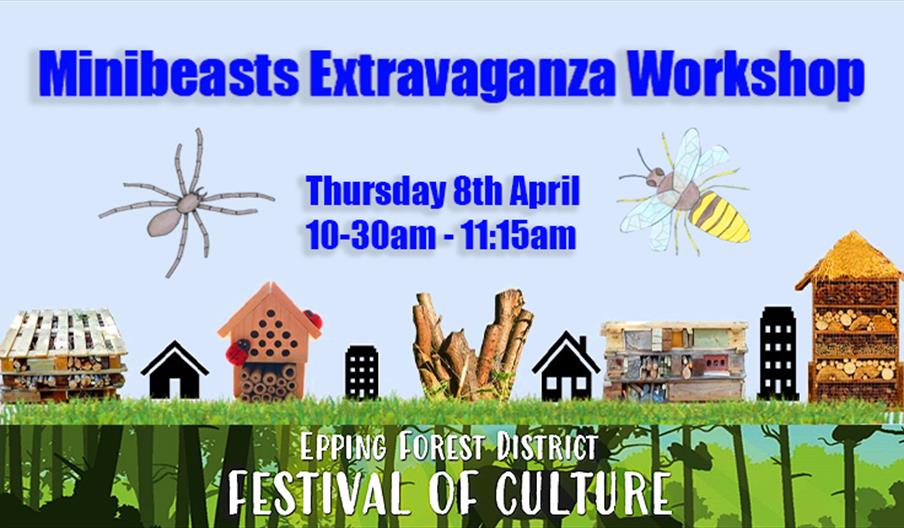
About
A Minibeast Extravaganza Workshop
Date: Thursday 8th April
Time: 10:30am - 11:15am
Event: Online workshop via Zoom
Price: £3.00 (Click HERE to book your space)
Age: Aimed at children 5+, but all participants must be accompanied by an adult
Proud to be part of Epping Forest District Festival of Culture
Join the Arts & Culture team for a 45 minute long session all about minibeasts! Hear some facinating facts, learn about where they live and do your bit to help them out!
You will be playing some games, taking part in a minibeast quiz and making a minibeast hotel from recycled and natural materials which you will have gathered. The minibeasts will think it's great!
Once booked on, a zoom invite will be sent, ready for the workshop.
Visit eppingforestdc.bookinglive.com to book or call the booking line 01992 564226 - Open Monday - Friday 10:00am - 4:00pm
Please gather the following materials before you join the zoom session for the minibeast hotel workshop:
A plastic bottle that you have finished using (for example a water bottle that you would normally recycle or a plastic milk carton)
Twigs
Leaves
Bark
Small stones
Optional extras: small strips of cardboard, bamboo, shredded paper, straw/pet bedding and some string.
Here are some funky fun facts about minibeasts!
There are lots of legs in the minibeast world, Ants have 6, Spiders have 8 and Woodlice have 14! They allow the minibeasts to move around quickly and climb around their habitats!
Millipedes and Centipedes may be similar as they both have lots of legs and move quickly but there are lots of differences too! Centipedes are carnivores and will hunt other minibeasts; whereas Millipedes are detritivores. This means they mainly eat things that are decaying such as fallen leaves.
Minibeasts are a vital part of the food chain! Slugs can be a big pest to gardens destroying various plants; however, there are lots of other creatures which feed on them, such as hedgehogs, birds or other minibeasts.
All minibeasts are invertebrates, this means they do not have a backbone and vary a lot in their shape and size. In the UK an earthworm was once discovered and it measured 40cm long!
Minibeasts can live in the water too, be it a pond, a river or even an ocean! Some minibeasts live part of their life underwater and then live part of their life flying around above ground.
Keep Updated
Keep updated on future Epping Forest District Festival of Culture events by following:
Epping Forest District Museum on Facebook
Epping Forest District Museum on Twitter
Epping Forest District Museum on Instagram
This event is being hosted by Epping Forest District Museum as part of Epping Forest District Festival of Culture 2021. For more information about the festival including further event listings, take a look at http://www.visiteppingforest.org/cultural-festival






